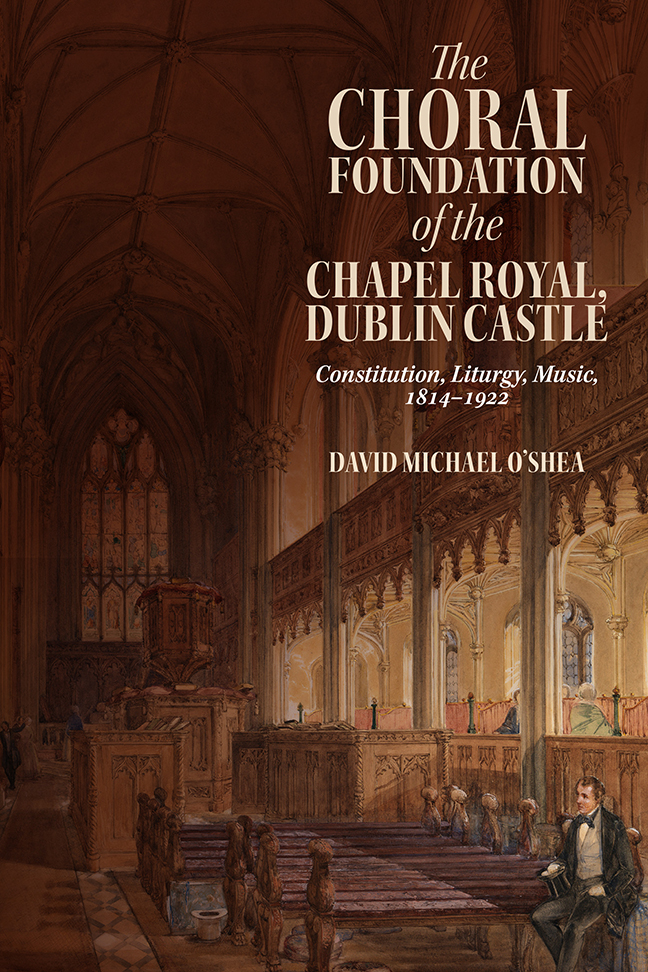Book contents
- Frontmatter
- Contents
- Illustrations
- Foreword
- Preface
- Acknowledgements
- A Note on Terminology
- Abbreviations
- Introduction
- 1 Precedents, Polity and Politics
- 2 Clergy
- 3 Churchmanship, Furnishings and Functions
- 4 The Musical Foundation
- 5 The Chapel Royal Music Collection
- 6 Singing the Liturgy
- 7 Organs
- 8 Boy Choristers
- 9 Gentleman Singers
- 10 Organists and Composers
- 11 The Chapel Royal's Legacy
- Conclusion
- Appendix A Lords Lieutenant, 1801–1922
- Appendix B Clergy of the Chapel Royal
- Appendix C Extant Chapel Royal Music Volumes (RCB MS 1113)
- Appendix D Boy Choristers of the Chapel Royal
- Appendix E Gentlemen Singers of the Chapel Royal
- Appendix F Organists of the Chapel Royal
- Appendix G Fragment of a Juvenile Chant by C. V. Stanford
- Bibliography
- Index
- Irish Musical Studies Previous volumes
10 - Organists and Composers
Published online by Cambridge University Press: 10 January 2024
- Frontmatter
- Contents
- Illustrations
- Foreword
- Preface
- Acknowledgements
- A Note on Terminology
- Abbreviations
- Introduction
- 1 Precedents, Polity and Politics
- 2 Clergy
- 3 Churchmanship, Furnishings and Functions
- 4 The Musical Foundation
- 5 The Chapel Royal Music Collection
- 6 Singing the Liturgy
- 7 Organs
- 8 Boy Choristers
- 9 Gentleman Singers
- 10 Organists and Composers
- 11 The Chapel Royal's Legacy
- Conclusion
- Appendix A Lords Lieutenant, 1801–1922
- Appendix B Clergy of the Chapel Royal
- Appendix C Extant Chapel Royal Music Volumes (RCB MS 1113)
- Appendix D Boy Choristers of the Chapel Royal
- Appendix E Gentlemen Singers of the Chapel Royal
- Appendix F Organists of the Chapel Royal
- Appendix G Fragment of a Juvenile Chant by C. V. Stanford
- Bibliography
- Index
- Irish Musical Studies Previous volumes
Summary
The ‘Organist and Master’
As we have seen, the annual estimates of the household of the Lord Lieutenant made provision for a salary for an ‘Organist and Master’, two roles which were usually undertaken by one person, but in at least one period were held by two different people. Between 1814 and 1922, nine different men held the position of organist of the Chapel. Some of these organists made notable contributions to the raising of musical standards in the Chapel through their stewardship of the choir and composition of new repertoire.
The ‘Propos’d Establishment’ of 1814 included the names of two organists: Sir John Stevenson, ‘Organist & Composer’, and James Duncan, ‘Organist’. This was an imitation of the ‘two Organists, and two Composers’ of the Chapel Royal, St James's Palace, as described by its Sub-Dean, William Holmes. Whilst, as we shall see, it appears that Stevenson undertook some duties as composer, there is no evidence that he ever played the organ in the Chapel or had any involvement in the running of the choir there. Several sources (including his memorial at Christ Church Cathedral) claim that he was the first organist of the Chapel, although it would seem that this distinction correctly belongs to Duncan, who was actually responsible for training the choir and playing the organ.
Duncan is first mentioned as organist in a Board of Works letter of April 1814, which shows that he was appointed prior to the opening of the Chapel. After the completion of the Chapel organ, Duncan played it in public for the first time on Sunday 6th August 1815. Though Duncan's son wrote to the Lord Lieutenant in February 1825 suggesting that his father would retire imminently, in 1827 Duncan placed an advertisement in the press denying a ‘frequently reported’ rumour that he had retired. He was still organist of the Chapel in September 1831, which suggests that he held the post right up until his death on 14th October 1831. His death notice stated that he had been ‘for 16 years Organist to the Castle Chapel’: this figure seems to have counted only from the time the organ was installed in 1815 (even though he had been appointed in 1814).
- Type
- Chapter
- Information
- The Choral Foundation of the Chapel Royal, Dublin CastleConstitution, Liturgy, Music, 1814-1922, pp. 193 - 212Publisher: Boydell & BrewerPrint publication year: 2023



